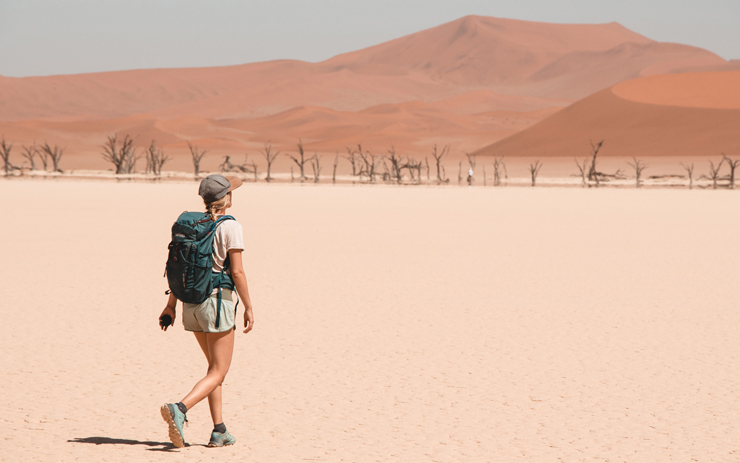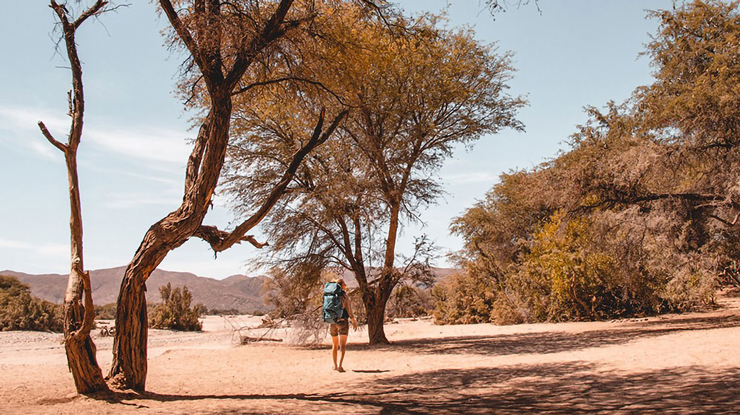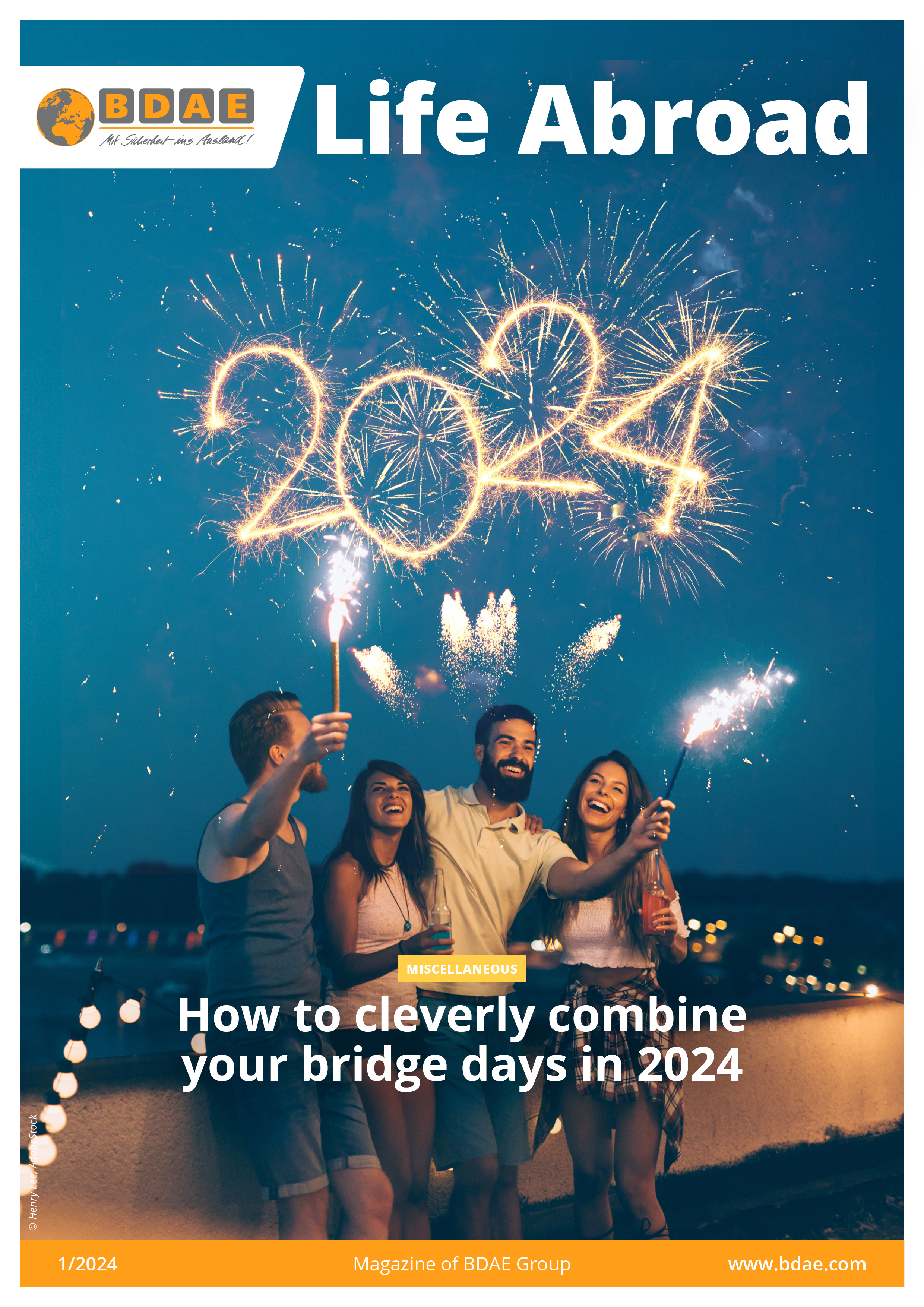"What really counts is the positive impact we can have on others and on our planet"
Franziska Consolati has been interested in how to combine sustainability and travel for many years. In this interview, she talks about how responsible travel can look in practice and gives some useful suggestions - from planning the trip to staying on site and afterwards.
One of the key questions in your book "Travel Hacks for the Climate Conscious" is: "Am I giving the world more than I'm getting from it?". When did you first ask yourself this question?
Consolati: I was travelling in southern Africa at the time. With my feet buried in the sand, I listened to the silence of the African night. Above me, a thousand stars stretched across the sky and I was the only one still awake. The fire crackled next to me, I heard elephants trumpeting in the distance and wondered if the bull we had roused from his sleep this morning was with us. Home suddenly felt infinitely far away. It was one of those moments when I once again had to think hard about my role on this earth.
My love for our planet began in the desert. I had only just come of age when my thirst for adventure drew me out into the world: Together with a Bedouin caravan, I travelled on foot in the Sahara. This journey was the starting signal, if you like - and a promise to myself that I would never stop discovering the world with the same open mind as I did at the age of 18.
And do you still manage to do that today?
Consolati: Yes, I'm still keeping that promise. I have since travelled to dozens of countries and have had the chance to embark on many more adventures. But when I look back, I realise that some of them I would no longer undertake - because they did not profit the world as much as they profited me.
"I think about how I can fulfil my travel intentions with as small an ecological footprint as possible"
For example, I can think of trips where the journey time did not make sense in relation to the length of my stay. Trips where I chose the plane rather than the train, out of sheer convenience. Today, when I go on a trip, I think a little further ahead in terms of sustainability. I am intentional about trying to reduce my ecological footprint as much as possible by asking myself: "what options do I have to make my project more sustainable?" And yet it's not just about what we don't do.
What does that mean concretely?
Consolati: Although I travelled on foot in the bush, I was on a plane for ten hours and 35 minutes to even set foot on South African soil. And it's no secret that aeroplanes increase our ecological footprint more than almost anything else. But, and this is the flipside: it's not just what we don't do that counts. It's also what we do that counts. What counts is the positive impact we can have on our fellow human beings and on our planet.
Elephants come to mind. In South Africa, as in many other countries, nature reserves and national parks are funded by visitor income. As one ranger put it: "Only when people pay money to see elephants - only then are elephants actively protected". This is urgently needed, because over the last hundred years, the African elephant population has declined by more than ninety per cent. If we all stopped flying, how long would the elephants still be alive?
"So the question is not whether sustainability and travelling go together."
The derivation is short, I know. But it is nevertheless correct. It is about much more than the elephant population. They are an example of everything that is being protected thanks to international tourism.
This is about the big picture, because sustainability is not just about climate protection. Species and environmental protection also play an important role. There are also social aspects that contribute to a fair world.
So the question is not whether sustainability and travelling go together, but how. As climate-conscious travellers, all of this concerns us, this big picture.
 © Franziska Consolati
© Franziska Consolati
And how can we bring climate-conscious travelling and sustainability together?
Consolati: It's an extremely complex issue. That's why I think it's important to mention that it's not just perfectionism that enables us to achieve our goal. It's not the case in life, and it's not the case in sustainability either.
Instead of blaming each other for not doing enough, let's celebrate the ten decisions in which we adopt sustainable behaviour. In 2019, for example, 1.5 billion people travelled abroad as tourists. If 1.5 billion people made more sustainable travel decisions, we'd all be taking a big step forward.
Whether our travel behaviour contributes to the protection of nature, the environment and species and strengthens the social structures of our world is entirely up to us. They start with our journey and continue throughout every single day. That's why this is a call for travelling - because not travelling can no longer be sustainable in our world today. It is a call for travelling without a guilty conscience, but in a way that is good for the world.
"Not travelling is not sustainable."
If I'm honest, I've long shied away from speaking out in favour of travel and sustainability in equal measure. Because the topic seems like a minefield. And I don't want to give the impression that I'm doing everything right. As if I always make the best decisions in terms of sustainability. I certainly don't - and I don't want to be seen as a role model.
For me, it's more about encouraging us all to do our best. To appeal to us to dare to make both our favourite causes equally: travel and sustainability. Because the two are directly linked.
I want us to have the courage to talk about all the small steps we are taking in the right direction. Instead of having to hide the ones that sometimes deviate a little from the path. I want to make a statement about all of this so that this minefield is no longer a minefield and we are no longer afraid to give this topic a voice.
What can we do as individuals to make travelling more sustainable than before?
Consolati: It starts with the choice of destination. Before I decide where to go, I ask myself a few tried and tested questions with regard to my ecological footprint. This order is a good one: Can I avoid any extra CO2 emissions? Can I reduce it?
CO2 emissions often cannot be completely avoided unless I set off from my front door by bike or in hiking boots. How can I still minimise or offset my ecological footprint? Offsetting emissions is the subject of much debate. But everyone agrees on one thing: CO2 offsetting is not a free ride, because it does not undo emissions. Nevertheless, offsetting is one way of making our travel behaviour more sustainable.
I wrote a blog article on this topic three years ago. Back then, I was already very interested in travelling and sustainability - even though I have grown in the subject since then and have certainly changed a few of my views.
 © Franziska Consolati
© Franziska Consolati
What does this mean for the way you plan your trips?
Consolati: If I want to go on a hike lasting several days, I can, for example, walk along the 300,000 kilometres of hiking trails in Germany. Or I can set off to our neighbouring countries - and avoid emissions as far as possible. But if I want to immerse myself in Buddhism and spend weeks learning personally from monks in Thailand, I can only reduce emissions to a limited extent - I should also compensate. Travelling to and from my trip makes up the largest part of my footprint.
"The journeys are the biggest part of my footprint".
75 per cent of all CO2 emissions attributed to tourism are caused by travelling to and from the destination. When we choose our travel destination, we are already making a decision that will have an impact on how we get there and back.
In order to make a sustainable travel decision at this point, we can, for example, work our way up from the lowest-emission option (walking or cycling) to the highest-emission decision (aeroplane, cruise ship). And stop at the solution that is both realistic for us on the one hand and as sustainable as possible on the other.
What role does the choice of accommodation play?
Consolati: This is about much more than waking up the next morning feeling rested. Accommodation offers the opportunity for real-life encounters. And they also play a decisive role when it comes to the ecological footprint of our journey. After transport, accommodation makes the biggest contribution. Or not - if we spend the night in a climate-conscious way.
The following questions bring us closer to environmentally friendly and fair accommodation: Who am I supporting with a booking? A possibly international investor who runs the accommodation purely for economic gain? Or committed locals? Where does the food on offer come from? Is the accommodation committed to sustainable tourism? Is the energy produced ecologically? Is the team at the property committed to minimising waste?
"I don't want to burden regions for which mass tourism has already become a problem."
I myself study some travel guides to find out where I won't be travelling. I don't want to burden regions for which mass tourism has already become a problem, but rather strengthen regions that are less likely to appear on travellers' radars. Sometimes there are only a few kilometres, a mountain range or an island between the two alternatives.
Food is an important subject when travelling. What advice do you have on this subject?
Consolati: Regional and social - that's the motto for focussing on sustainability when it comes to food. It's worth looking for restaurants in the inconspicuous side streets instead of queuing up where most Google reviews or an entry in the travel guide lead you.
The small roadside food truck, behind which the same old man always stands, or the cookshop on the outskirts of town: they often provide us with the freshest and most authentic food. Anything that is not regional or seasonal is usually too expensive for this type of cuisine - instead, locals work hand in hand to help each other out. And we can be their engine. By the way: the Happy Cow app is the largest database of vegan and vegetarian restaurants to date. Over 120,000 addresses are listed worldwide - and the number is growing every day.
We all have a responsibility to protect what we love the most. And the fact is that people are able to stand up for what they know and what seems close to them. So let's all be ambassadors, share our stories and tell people everywhere how beautiful and worthy of protection our planet is.

